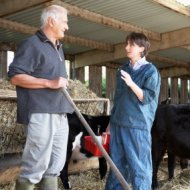FVE welcomes agreement on Animal Health Law

The draft specifies that professional animal owners are to receive regular animal health visits from a vet.
An informal 'trialogue' agreement on the Animal Health Law has been welcomed by the Federation of Veterinarians of Europe (FVE).
The agreement was reached by the European Parliament, the Latvian presidency of the Council of ministers, and the European Commission.
The draft EU law - on diseases that are transmissible among animals and potentially to humans - will merge and update existing scattered directives and regulations into a single package of coherent legislation.
FVE particularly welcomes the provisions on farm animal visits. The draft specifies that professional animal owners are to receive regular animal health visits from a vet, for disease prevention, detection and biosecurity.
FVE president Rafael Laguens commented: "This is a huge step forward. [These visits] are the cornerstone of the 'prevention is better than cure' strategy and indispensable for the prevention and early detection of known and emerging transmissible diseases."
Professional animal owners will also be required to apply the principles of good animal husbandry and the responsible use of veterinary medicines. Professional pet keepers and breeders will need to be registered, while the Commission may ask Member States to establish an electronic database of dogs and other pets.
"This would not only help the illegal puppy trade, but would also help monitor the movement of pets that may harbour transmissible animal diseases," Rafael added.
The name of the Animal Health Law has been changed to regulation on Transmissible Animal Diseases. Its provisions will be mandatory throughout the EU as soon as the document enters into force.
The draft law is now awaiting approval and is expected to be ready for adoption in the autumn.



 The Animal and Plant Health Agency (APHA) has updated its online reporting service for dead wild birds.
The Animal and Plant Health Agency (APHA) has updated its online reporting service for dead wild birds.